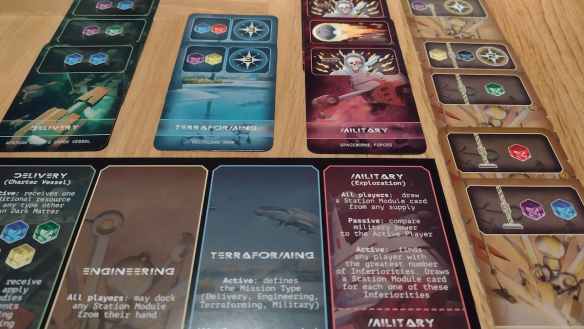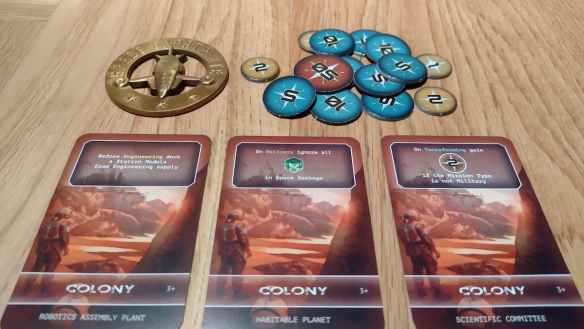The Space Expatriate board game is a sci-fi card game in the vein of Race for the Galaxy for two-to-four players. It takes around an hour to play, and the suggested age range of 12+ feels right. Players choose roles to take actions, playing cards into their tableau to chain effects and then banking them to claim colonies for end-game points.
Related: Essen Spiel 2022: Reviews incoming
In the box, you’ll find 160 cards, 43 cubes, around 50 cardboard tokens, four thin cardboard player mats, and a slightly ridiculous yet equally glorious sturdy metal start player token. Looking at comparison site Board Game Prices you can find it for around £40 plus shipping, which is a bit much for what you get. Also, unfortunately, at the time of writing it is not available directly in the UK.
Teaching Space Expatriate
Teaching the Space Expatriate board game is relatively straightforward for anyone who has played a game such as Race for the Galaxy, or other action selection engine builders. The biggest issue is the rulebook, which was clearly written by someone new to the idea of rulebooks and then translated very poorly into English.
The game has four types of action cards (delivery, engineering, terraforming, military), plus colonization cards. Each is shuffled into its own draw deck, with a few colony cards always face up (player count dependent). Players get one card from each action card deck to make their starting hand. Players then draft four more cards from the four action decks until each has a four-card starting tableau, called your space station. To finish setup, turn over one card from each action deck to begin the first round.
During a round, each player will take one of the available action cards and place it into their space station before doing the related action. You’ll get to do the action you choose with a small bonus, then every other player gets to do the same action. Rounds continue until one player has 10 colonies, or all players collectively have 10/15/20 (for 2/3/4 players). You then work out your final score by cross-referencing your victory points gained versus your colonies created.
Card actions
Delivery cards represent goods you can collect, which come in six types represented by cubes. The delivery action sees you collect the cubes on your station’s Delivery cards, minus those in space garbage (we’ll come to that). As part of the same action, you then run them through your cube engine - which is all the Engineering cards you have on your space station. Taking the Engineering action itself allows you to play a card from your hand to your space station. Engineering cards allow you to turn cubes into better cubes or victory points.
Taking the Terraforming action gives you a card you can spend cubes on when you run your engine. But it also allows you to remove cards from your space station to form colonies. These buy you a colony card, giving both an ongoing bonus plus a victory point multiplier for the end game. But also reduces your station’s ability to create cubes and points. Finally, the Military card/action allows you to get more cards into your hand from the draw piles. Each military card has a symbol, and having supremacy in these symbols makes your military action stronger, sometimes allowing you to steal cards from another space station.
The four sides
These are me, plus three fictitious players drawn from observing my friends and their respective quirks and play styles.
- The writer: There are so many good ideas in the Space Expatriate board game. But these are overshadowed by a lack of finesse. Ideas that stick the landing are held back by those that don’t. If they’d tried to reinvent the spokes rather than the whole wheel, this could’ve been a success. Instead, it is a brave attempt that stumbles over its own ambition.
- The thinker: The central conceit of building/keeping your engine vs dismantling it for colonies, knowing you need to do both to score, is a fascinating one. some of the engine ideas also work well, such as space garbage. Cubes you produce but can’t use in your engine go in the garbage, and all players subtract all the garbage from the cubes they can produce next time. This can result in complex strategies, as the garbage empties after the next Delivery action. But unfortunately, too much else is either too random, ill-conceived, or underdeveloped to make the game fun overall.
- The trasher: The competitive idea of the military cards seems sound, but it is a fiddly thing to work out every round. This is made worse by the fact you’re largely getting random Military cards, so you rarely get to choose who you’re getting ahead of. And I usually love a good dick move but being able to take a card from a player’s space station? It doesn’t fit the rest of the game’s feel and can be devastating. While again, who you do it to is rarely something you can dictate.
- The dabbler: No thanks! And what a terrible name…
Key observations
The Space Expatriate board game has 17 ratings on Board Game Geek at the time of writing. This tells you just how under the radar this one flew at Essen 2022. I was talked through the rules at the press preview having heard nothing about it previously. And the clear comparisons to Race for the Galaxy sold me on the spot. Reading the rules gave me a good vibe, so I also looked forward to playing it.
The idea of engine construction, then deconstruction, is excellent. It is a hugely tactical game, with a large amount of randomness meaning you’re largely trying to make the best of the situations you find yourself in. Again, this is a lot of fun in theory. The engine itself is nice and simple, so you’re not having to construct something complex. Sometimes luck means it won’t work well at all, but hey - just deconstruct it for a colony and go again.
The problems
The problems start with the Military cards, which also dictate turn order (a very poor design choice). Working out who has supremacy each turn is boring and fiddly, and can swing between being completely arbitrary to creating (often accidental) game-changing situations. Working out the next turn’s start player can really screw you over, especially with four players. And military is powerful enough, without needing this extra bonus.
With four actions and four players, every action will be played each turn. This means the last player has no choice, which is a poor design choice. Also, there is no jeopardy the action you need won’t happen which removes the joy of this mechanism when compared to Race or Puerto Rico. Finally, the final scoring of the game feels underwhelming. Everyone ends up with between 0-9 points as you look along your number-of-colonies line and see what your victory points tally to on it. I expect this has been worked out through testing, but I’m not sure it ever feels legitimate. We were never left convinced the best player had won.
Conclusion: Space Expatriate board game
I wanted to fall in love with this game and so nearly did. But in the end, the poorer elements were enough to overtake the good ones and mean I’ll be moving Space Expatriates on. It leaves me wondering what would’ve happened if a top developer had got hold of the core concepts. Because the good ideas here are fantastic. Who knows? Maybe a bigger publisher will get a sniff of this and take a second look. I hope so. Because there’s a great game in here that I’d love to play.
- Thanks to al-Khwarizmi Games for providing a copy for review.
- Follow this link for 200+ more of my board game reviews.



